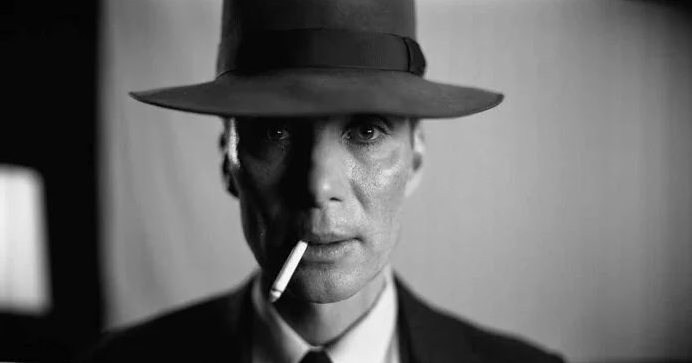Like many of his previous films, Christopher Nolan’s “Oppenheimer” is so caught up in its own excess that it forgets to sufficiently explore the humanity of the titular nuclear physicist. Parts of his life outside of his involvement with constructing the atom bomb, such as his leftist political leanings and his fraught romantic relationships, are briefly touched upon, but his interior self seems distant, locked away behind the steely indecipherable gaze of lead actor Cillian Murphy. Yet in willfully throwing aside Oppenheimer’s complexity, the film becomes something else entirely. The film is less a character study and more a morality tale: a bleak, uncompromising look into the dehumanizing effects of the collision between scientific progress and political ambition. It’s a thriller, but one in which the cathartic outburst of violence — the result of all that pent up suspense — is eerily silent.
Adapted from “American Prometheus,” Kai Bird and Martin J. Sherman’s Pulitzer Prize-winning biography, Nolan’s film follows Oppenheimer’s career as a scientist, his political history and how the two affected his personal life, doing so by presenting his life in fractured form, frequently jumping back and forth through time.
Color film stock represents Oppenheimer’s own perspective. Played rather pensively by Murphy, Oppenheimer perhaps sees the world through rose tinted glasses. A Jewish leftist, he frequently makes moral justifications for his work, claiming that if the United States doesn’t build the bomb then Nazi Germany would almost certainly beat them to the punch. Yet when Germany surrenders in May 1945, he is surprised to learn that work on the bomb will continue, irreparably shaking his idealistic worldview to the core. Now he’s locked in with no way out, and he becomes withdrawn and reflective, realizing too late his own complicity in perpetuating the injustice he sought to destroy and his powerlessness in stopping it. Black and white, on the other hand, signals the perspective of Lewis Strauss (Robert Downey Jr.), Oppenheimer’s rival and a member of the Atomic Energy Commission founded shortly after the war’s end. Strauss, fueled by a personal grudge against Oppenheimer, sees the gray areas that his rival can’t. He accepts that the state of the world post-atomic bomb is far too complex to be fixed by idealistic solutions and instead chooses power and material gain. The interaction between the color and black-and-white sections of the film creates a push and pull effect that drives the narrative forward that is only intensified by the deft editing. For a three-hour movie, mostly consisting of dialogue heavy scenes of historical figures waxing philosophical in boardroom settings, it’s surprisingly kinetic. Nolan’s blockbuster chops are on full display, and the tension in knowing exactly how destructive Oppenheimer’s invention proves to be elevates the movie from stuffy drama to a suspense picture Hitchcock would envy.
But for all of its interest in the moral implications of the atomic bomb, “Oppenheimer” can’t help but falter in its treatment of the characters’ humanity. We never get a strong grasp on Oppenheimer’s wife Kitty (Emily Blunt), nor his on-and-off lover Jean Tatlock (Florence Pugh), both of whom seem to only exist in the narrative to motivate Oppenheimer. There is something to Blunt’s performance — Kitty’s loyalty to Oppenheimer in spite of the toll his work takes on their home life comes off as especially tragic, and Blunt conveys her anger towards and emotional distance from her husband with aplomb — but Pugh’s Tatlock, who was arguably Oppenheimer’s most interesting personal relationship, feels underutilized. And here lies the film’s biggest problem: the breakneck pacing never gives us enough time to slow down and truly get to know the characters on a personal level. A who’s who of actors populates the movie, yet most of the characters come off as historical action figures. In Nolan’s films, there is always a cold distance between the audience and the characters. Cinema allows the audience to see their own humanity in those that are their exact opposite in every way, yet Nolan is a technical filmmaker to the point where his films overlook the subtler aspects of cinema. A large part of the appeal of biographical pictures is that they allow the audience to better understand how their subjects exist as human beings — the genre’s best films, like “The Social Network” and “Malcolm X,” help deepen our understanding of real people who have become abstracted by their own historical significance. Even Oppenheimer himself, famously charismatic in real life, remains trapped behind the icy blue eyes of Cillian Murphy. “Oppenheimer” may not understand its subject, but it understands the ripple effect his actions continue to have to this day.








































































































































































































